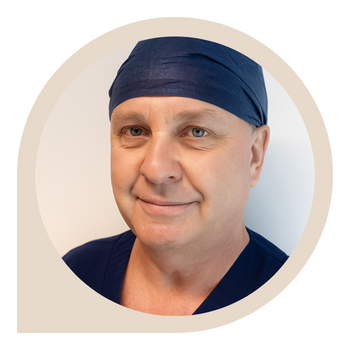Dento-alveolar surgery
Tooth Extractions
Tooth extractions are sometimes necessary to protect your oral health, relieve pain, or prepare for further treatment. As an Oral and Maxillofacial Surgeon with over 25 years of experience, Dr Mark Irving provides expert care in all types of dental extractions, from routine to complex cases. He also specialises in dento-alveolar surgery, which involves procedures affecting the teeth, jawbone, and surrounding tissues, including the removal of impacted teeth, exposure of unerupted teeth, and bone reshaping for dentures or implants. Dr Irving also treats oral pathology, such as cysts and tumours, and manages facial trauma, including jaw and cheekbone fractures, delivering skilled, compassionate care across all areas of oral surgery.
Why is it done?
Tooth extractions are sometimes necessary to relieve pain, prevent infection, or support your overall oral health. Whether you need a problematic wisdom tooth removed or another tooth extracted due to decay, injury, or overcrowding, Dr Mark Irving offers experienced, compassionate care. As a specialist Oral and Maxillofacial Surgeon, Dr Irving is highly skilled in performing both simple and complex extractions, ensuring your comfort and safety at every step.
Persistent pain or infection that doesn’t respond to other treatments
Advanced gum disease causes loose or unstable teeth
Impacted or problematic wisdom teeth (third molars)
Overcrowding, where extractions are required to allow other teeth to move into position, often before orthodontic treatment
Preparation for dentures or dental implants
What to Expect
Dr Irving conducts a thorough assessment, including X-rays if needed, to understand your specific needs. He will explain the reason for extraction, outline your options for sedation or anaesthesia, and answer any questions you may have. The procedure itself is performed with a focus on comfort and safety, using the latest techniques and equipment.
Our Approach
Step 1
Consultation and Assessment
Book an appointment with us, and we’ll conduct a thorough clinical examination of your teeth, supplemented by X-rays if necessary. This helps us determine whether an extraction is necessary and allows us to plan the safest and most effective approach for your situation.
Step 2
Procedure and Recovery
Your extraction will be carried out as a day procedure, usually under local or general anaesthetic, depending on your needs and preferences. Once the tooth is removed, you’ll be given clear aftercare instructions to manage any discomfort and support a smooth recovery.
Step 3
Follow-Up and Healing
We’ll arrange a follow-up visit to check on your healing, address any questions, and ensure your mouth is recovering as expected. Most patients can get back to their usual activities within a few days by following our care advice and instructions.
Reasons for Tooth Extraction
Tooth extraction may be recommended for several reasons, all aimed at protecting your overall oral health. Common reasons include severe tooth decay that cannot be restored with a filling or crown, advanced gum disease that has loosened the tooth, or extensive damage from trauma or fractures. In some cases, teeth may also be removed to relieve pain from infection or abscesses, or as part of an orthodontic treatment plan to create space for proper alignment. Every recommendation for extraction is made only after careful assessment and when no other options for saving the tooth are suitable.
The Extraction Process
The extraction procedure itself is carefully planned and tailored to your needs. Before any tooth is removed, a comprehensive clinical examination and X-rays are performed to assess the tooth’s condition and surrounding structures. Dr Irving explains the process, discusses anaesthesia options—such as local anaesthetic, sedation, or general anaesthetic—and ensures you are comfortable and informed. During the procedure, every effort is made to minimise discomfort, using gentle, precise techniques to remove the tooth safely and efficiently.
Wisdom Teeth Extractions
Wisdom teeth are the last adult teeth to emerge, usually during the late teens or early twenties. For many people, there is insufficient room in the jaw for these teeth to erupt normally, resulting in impaction, pain, or infection. Sometimes wisdom teeth grow at an angle, press against neighbouring teeth, or remain trapped beneath the gums. Dr Irving specialises in the assessment and removal of problematic wisdom teeth, offering tailored solutions to prevent or treat infection, discomfort, and long-term complications.
Recovery and Aftercare
Proper care after an extraction is essential to ensure a smooth and comfortable recovery. You will receive clear instructions on how to care for the extraction site, including how to manage swelling or discomfort, what foods to avoid, and signs to look out for. Following these instructions helps reduce the risk of complications such as dry socket or infection. Most patients recover quickly and can resume normal activities within a few days. Still, Dr Irving and his team are always available to answer questions and support you throughout the healing process.
Replacement Options After Extraction
Losing a tooth does not mean you have to live with a gap in your smile. There are several options available to replace missing teeth, including dental implants, bridges, or partial dentures. Dr Irving will discuss the best options for your needs, taking into account your oral health, lifestyle, and long-term goals. Replacing missing teeth can help restore your ability to chew and speak, maintain the shape of your face, and prevent other teeth from shifting out of position.
Post-Op Care
Please use the following information as a general guideline. If you have any concerns after surgery, please get in touch with Dr. Irving's office at (02) 9890 1822.
Important
You should reach out to your surgeon, general practitioner, or the nearest accident and emergency department if you experience any of the following issues:
Severe pain that is not relieved by the recommended medication
Ongoing bleeding
Any other significant problems following the operation



